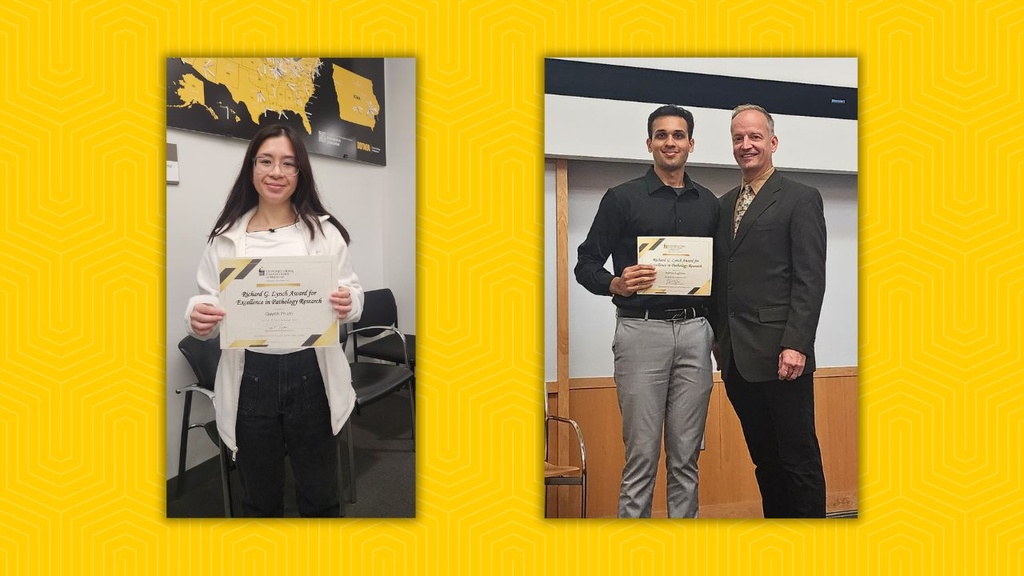Featured News

Pathology mentees awarded Richard G. Lynch Award for Excellence in Pathology Research
Monday, October 13, 2025
Aditya Joglekar and Quynh Pham, mentored by Nitin Karandikar, MD, PhD and Shujie Yang, PhD, were presented with the Richard G. Lynch Award Excellence in Pathology Research at the Medical Student Research Conference.

Shravan Kumar Kannan receives Ballard & Seashore Dissertation Fellowship for Spring 2026 Semester
Tuesday, September 30, 2025
Shravan Kumar Kannan receives Ballard & Seashore Dissertation Fellowship for Spring 2026 Semester. Kannan is an Immunology PhD candidate in the Interdisciplinary Graduate Program in Immunology and member of Vladimir Badovinac, PhD's research laboratory.

Kshitija Kale receives Ballard & Seashore Dissertation Fellowship for Spring 2026 Semester
Monday, September 29, 2025
Kshitija Kale, MD. receives Ballard & Seashore Fellowship Award for Spring 2026 Semester. Dr. Kale is a student in our Experimental Pathology PhD program and a member of Nitin Karandikar, MD, PhD's research laboratory.

A look back on 22 years with Dr. Marcus Nashelsky
Wednesday, September 17, 2025
After 22 years in the Department of Pathology, Dr. Marcus Nashelsky has retired.

Karandikar Lab finds that disease-suppressive CD8+ T cells influence dendritic cells in experimental autoimmune encephalomyelitis
Monday, September 15, 2025
Nitin Karandikar, MD, PhD’s research laboratory focuses on the immune processes that underlie the pathogenesis of multiple sclerosis, which is an immune-mediated demyelinating disease of the central nervous system (CNS). His research group was the first to show the unexpected finding that CD8+ T cells targeted toward CNS antigens can suppress disease activity and could potentially be used as a therapeutic approach.

Review of primary ciliary dyskinesia with broncholithiasis case reveals new insights in PCD research
Monday, September 8, 2025
In a recent case report published in the American Journal of Respiratory and Critical Care Medicine, a 41-year-old male was referred to the University of Iowa with bronchiectasis, chronic sinusitis, and peculiar airway calcifications.

Badovinac research laboratory featured in American Association of Immunologists article
Thursday, September 4, 2025
Vladimir Badovinac, PhD and his research laboratory were recently featured in the American Association of Immunologists for their article, titled The ability of memory CD8 T cell subsets to numerically and functionally recover following whole body irradiation is influenced by their history of cognate antigen exposures.

Banafshe Dolatyar wins Trainee Professional Development Award from the Society for Neuroscience
Friday, August 22, 2025
Banafshe Dolatyar, PhD, a Postdoctoral Research Fellow in Marco Hefti, MD’s research laboratory, received the Trainee Professional Development Award (TDPA) from the Society for Neuroscience.

Kang Lab uncovers inflammatory role of oligodendroglial cells in autoimmune neuroinflammation
Thursday, August 21, 2025
Researchers in Zizhen Kang, PhD’s research laboratory, in collaboration with Ashutosh Mangalam, PhD’s research laboratory, have discovered that oligodendroglial lineage cells (OLCs)—traditionally known for producing myelin—actively contribute to neuroinflammation in experimental autoimmune encephalomyelitis (EAE), a widely used model for multiple sclerosis (MS).

Mallory Shin wins Kwak-Ferguson Award in Neuroscience
Wednesday, August 20, 2025
Mallory Shin, a student in the Interdisciplinary Graduate Program in Neuroscience and a member of Marco Hefti, MD’s research laboratory, received the Kwak-Ferguson Award in neuroscience.

Dr. Ashutosh Mangalam, Professor of Pathology, awarded Honorary Professorship by Old Herborn University Foundation
Tuesday, August 12, 2025
We are pleased to share that Dr. Ashutosh Mangalam, Professor of Pathology, has been awarded an Honorary Professorship by the Old Herborn University Foundation in recognition of his contributions to microbiome research, particularly in the context of neurological diseases such as multiple sclerosis (MS).

Bosch Lab identifies connection between pathobionts and colitis-associated cancer progression
Wednesday, August 6, 2025
The Bosch Lab, led by Dustin Bosch, MD, PhD, is studying how the gut microbiome is related to CAC development. IBD patients have perturbed microbiomes (dysbiosis), and specific bacteria (pathobionts) may promote carcinogenesis in the inflamed intestine.
Pagination